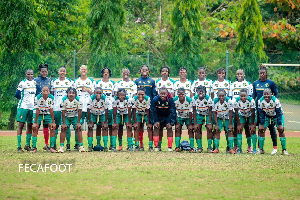To an outsider, the forest of Southeastern Cameroon appears silent and still, but to the native Baka, it is teeming with smells, sights, and sounds of flora and fauna. The Baka can navigate overgrown forest trails effortlessly, imitate animal calls precisely, and smell an unseen gorilla from yards away.
Their understanding of the plants, animals, and waters has been developed and passed down from generation to generation.
However, the lack of pre-primary education means that many children enter primary school without the foundational skills they need to learn basic letter sounds, numbers, and shapes.
With support from National Geographic’s Genographic Legacy Fund, a coalition of Baka communities developed a mobile preschool that brings early language education to the forest.
Organizing Around Education The Baka have continually adapted to environmental changes and outside influences by adjusting their hunting and gathering techniques and engaging in trade. The rise of mining, logging, and poaching, however, has pushed the Baka into day labor on neighboring farms, making them leave their ancestral traditions behind.
Illiteracy prevents Baka communities from understanding and defending their rights. To build foundational literacy skills and cultural pride in young children, the community coalition started the Chasing Two Rabbits at Once project, a mobile pre-primary program that fosters cultural preservation and empowerment through education.
Chasing Two Rabbits at Once helps Baka children be confident, successful learners in school, while fostering pride in their Baka culture, effectively “chasing two rabbits at once.” According to project staff member Rene Mkpwassene, the project “addresses the problem of a lack of pre-primary schools in Baka villages, since in all of the Lomie district, there are no pre-primary schools in any of the villages.”
The project team first conducted a baseline study in ten villages then worked with community members to draft, review, and test the curriculum. To make sure the project stays responsive to community needs, the project team will engage parents and community leaders in an informal ‘board of directors’ in each village for input on cultural relevance and program effectiveness.
The lessons consist of interactive scripts that use games, songs, and participative activities to help children acquire the building blocks of literacy.
Not only do the lessons teach basic counting and letter-sound recognition in Baka and French, they also teach students that mistakes are part of the learning process. After being recorded by Baka voice actors onto hand-crank powered MP3 devices, the lessons will be distributed to pilot villages in early 2015.
With the guidance of the lesson facilitators, students will be able to play and replay the lessons on the MP3 devices. The pilot program lasts until September, planning to prepare students for the beginning of next school year.
The Baka community is using new technology to help bridge the gap between traditional skills and formal schooling. Through the program children can master numbers while learning to catch fish in rushing streams. After gathering edible plants from the forest floor, they can practice writing the alphabet. From integrated community education, emerge the next generation of Baka cultural ambassadors.
The Genographic Project Legacy Fund, funded by a portion of the proceeds from Geno 2.0 DNA Ancestry Kits, helps to revitalize indigenous languages and cultures around the world. For more information visit the Legacy Fund website.
Actualités Régionales of Friday, 9 January 2015
Source: Cameroon Journal













